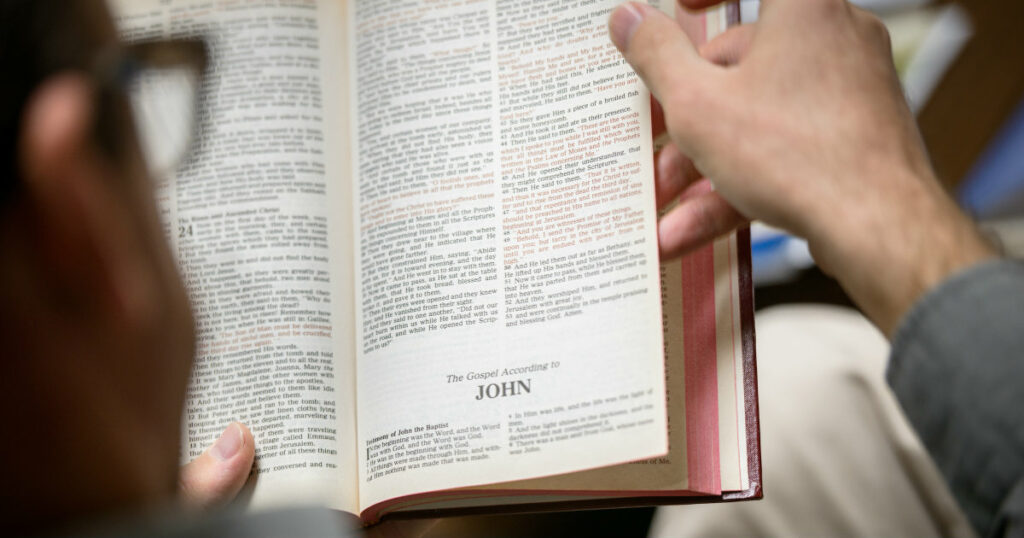by Matthew C. Harrison
Ours is a day of tremendous ignorance, particularly about the Bible and the Christian faith. Foolish and ignorant views about the Bible and its message abound. How many times have we heard that the Bible has allegedly been translated so many times into different languages that the original text has been lost and no one actually knows what it was or what it means.
In fact, we have more reliable ancient manuscripts of the Bible in its original languages (Hebrew, Aramaic and Greek) than any other ancient literature. The books of the New Testament were carefully copied and spread throughout the ancient Mediterranean world and beyond. Any errors scribes made in copying are overwhelmingly identifiable as the result of speaking or hearing while one person read the text and several copied, or perhaps when a scribe tried to “fix” a New Testament text that bothered him because it was difficult to understand, to harmonize with another text. These are easily identifiable, especially because loads of other manuscripts express the original. A couple of sections of the Gospels are not in all the ancient versions (like the long ending of Mark), but there is no Christian doctrine that depends only on these few texts.
The Old Testament Hebrew text is amazingly reliable. Prior to the discovery of the Dead Sea Scrolls in 1946–1947, the church relied upon a Hebrew text from the 9/10th century. All of a sudden, archeologists found manuscripts a thousand years older, and including many whole books of the Old Testament plus many smaller fragments. The Dead Sea texts and the manuscripts from a millennium later are nearly identical. Ancient Jewish copyists ensured this accuracy by counting letters from the front and back of the Old Testament books, and if the numerical center of the manuscript did not land on a certain letter of a certain verse, the manuscript was hidden or removed from use.
When we confess the “verbal inspiration” of the Bible in all matters, and thus the “inerrancy” of Scripture, we confess this most precisely about the original manuscripts that came from the hands of the prophets, apostles or their secretaries. That doesn’t mean there are not challenges and difficulties, some of which may not be able to be solved in this life. We trust the Holy Spirit and figure He knows more than we do, or assume some scribe made a mistake in copying. And remember, any time you find such a rare problem in the Bible, some 2,000 years of Christians have already dealt with the problem.
The teachings of the Christian faith are, in fact, quite clear. They are found in extremely clear, uncontested biblical texts. For example, every statement of the Apostles’ Creed is linked to clear texts, and most often many clear texts. Luther’s Small Catechism with Explanation (2017) builds on these clear teachings of Scripture. This updated edition teaches God’s Word especially well.
I recently asked members of my own parish how many had the new catechism from The Lutheran Church—Missouri Synod (LCMS) and Concordia Publishing House (CPH). I was amazed at how few did. Luther’s catechism proper (the Six Chief Parts) provides the strong doctrine-laden texts that make clear the basics, without which a person cannot be a Christian (Ten Commandments, Apostles’ Creed, Lord’s Prayer, Baptism, Confession, Lord’s Supper). The explanation provides hundreds of crystal clear texts that teach every aspect of the faith, whether the justification of the sinner before God; who God is, Father, Son and Holy Spirit; who Jesus is as God and man; the Sacraments; the church; what is a pastor. It also addresses challenging ethical issues we face today such as marital problems, racism, abortion, drug abuse, giving to those in need and much more. Get the new catechism. In fact, get a stack of them for everyone in your congregation. Make them available to all members to share with their family and friends.
I was in Nebraska a few weeks back for their district convention. An older farmer pulled me aside and said, “Pastor, I have to tell you something.”
“What’s that?”
“Pastor, I see people, young people hurting or confused.” He began tearing up. “I know it when I see ‘em, Pastor. I know they’re hurting. You know what I do, Pastor? I give them a catechism.”
“Oh,” I said, “You give them the little pamphlet edition of Luther’s Catechism, just Luther’s part?”
“No, Pastor, I give ‘em the whole thing. You wouldn’t believe what happens.” He proceeded to tell me amazing things that happened in the life of the recipients: conversions to Lutheranism, fresh comfort from the Word and consolation in the midst of struggles.
Last week I went to CPH, and I bought a stack of them. Before I got home that day, I gave away three — two to people looking for a church that teaches the Word of God.
“How can I, unless someone guides me?” the Ethiopian eunuch asked Phillip (Acts 8:31). We often have the same question. It’s vital to know the clear and main teachings of the Bible to be able to read it most profitably. That’s what the catechism is and does. It’s nothing but the Bible. That’s why Luther translated the New Testament so early in the Reformation (and continued on to translate the Old Testament as well); it’s why he wrote the Small Catechism and Large Catechism in 1529. The catechism is our Phillip.
Read your Bible. Read it daily. Read your catechism. Read it daily. Buy your kid and grandkids the new catechism. Get The Lutheran Study Bible. Buy your kids CPH’s Bible story books. Knowing the Word of God will make you confident in your salvation, wrought by Christ and pointed to by the whole Bible. God works through His Holy Word (including the texts in the catechism) to create faith in those who hear and read it. “So shall my word be that goes out from my mouth; it shall not return to me empty” (Isaiah 55:11).
–Pastor Harrison






